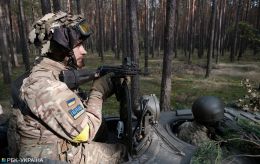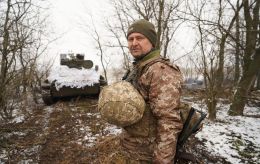New aid to Ukraine and messages to Putin: Outcomes of Ramstein-format meeting
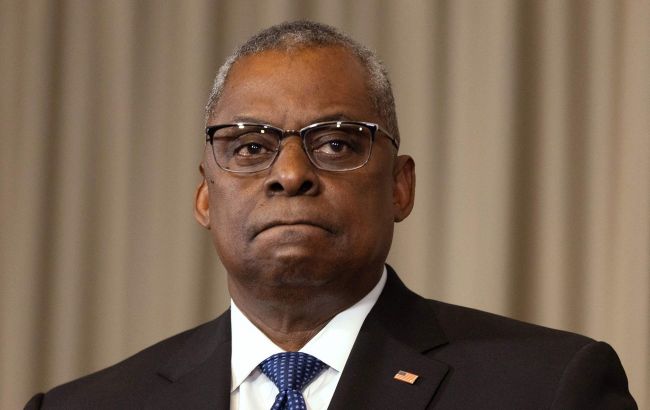 The head of the Ukraine Defense Contact Group, Lloyd Austin (Photo: Getty Images)
The head of the Ukraine Defense Contact Group, Lloyd Austin (Photo: Getty Images)
At the American airbase in Germany today, March 19, the 20th meeting of Ukraine's allies in the Ramstein format took place. The urgent needs of the Defense Forces for weapons were discussed, and new aid packages were announced.
RBС-Ukraine reports on the outcomes of the twentieth Ramstein.
Materials were prepared using statements from US Defense Secretary Lloyd Austin and Chairman of the Joint Chiefs of Staff General Charles Brown, the Telegram channel of the Ministry of Defense of Ukraine, and announcements of military aid from Germany, Finland, and other partners.
Content:
- Support for Ukraine and messages to Putin
- Ramstein format to continue, no forecasts on billions from the US
- What aid did the allies announce?
Support for Ukraine and messages to Putin
At the opening of the Defense Contact Group meeting, Lloyd Austin, the head of the group, spoke about the high cost Russia is paying for the war against Ukraine. According to him, at least 315,000 Russian military personnel have been killed or wounded. Moscow has spent $211 billion on deploying troops and conducting military operations, with additional losses of potential economic growth totaling around $1.3 trillion.
"Now, Ukraine's troops face harsh conditions and hard fighting. And Ukraine's civilians endure a constant barrage of Russian missiles and Iranian drones. But Ukraine won't back down. And neither will the United States. So our message today is clear. The United States will not let Ukraine fail. This coalition will not let Ukraine fail. And the free world will not let Ukraine fail," the Pentagon chief noted.
According to him, today's Ramstein was supposed to determine what Ukraine needs here and now to withstand Russian aggression. He emphasized the contribution of Czechia, which found a way to obtain artillery shells.
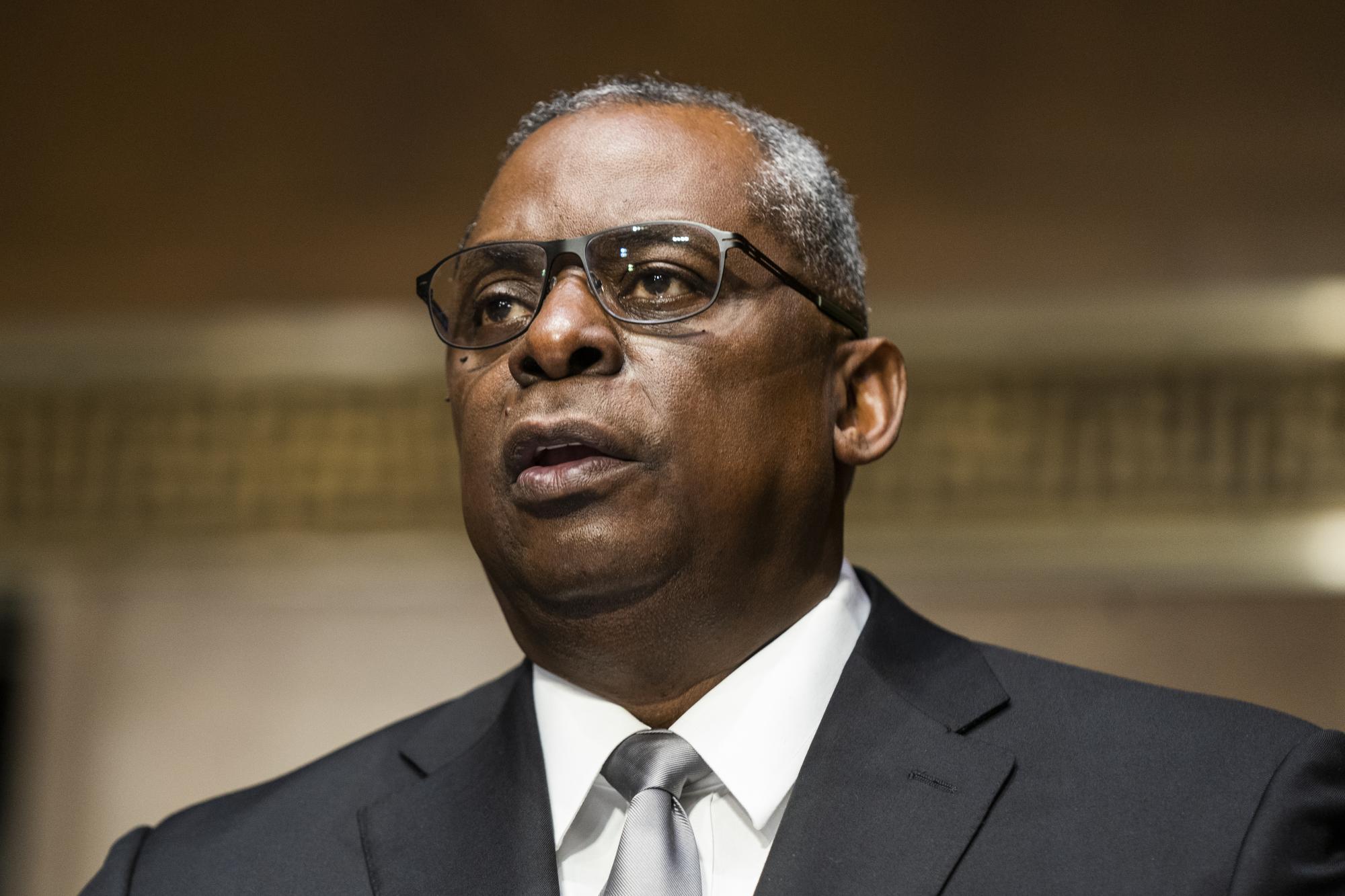
Photo: Lloyd Austin promised that the US would not allow Ukraine to be defeated and sent messages to Putin (Getty Images)
In February, Czech President Petr Pavel announced the possibility of purchasing 800,000 shells (for $1.5 billion) from third countries, after which allies began allocating funds for this initiative. It became known at the beginning of March that the necessary funding had been raised. At the moment, the first batch of 300,000 units has been agreed upon. According to the WSJ, Prague's initiative could potentially supply an additional 700,000 shells.
Today, negotiations were also held with the leaders of Estonia, Denmark, Germany, Iceland, Italy, Latvia, Lithuania, Luxembourg, the Netherlands, Norway, and Poland as part of the coalition of capabilities. Allies discussed issues of drone supply, training, and coordination of the defense industry.
"The eight capability coalitions have made significant progress in recent weeks. We'll keep working together with all of the capability coalitions to identify gaps, to maintain cross-cutting needs, and to help Ukraine build a formidable force for the future," emphasized the US Defense Secretary.
He also called support for Ukraine an investment in the security of Europe and the world.
"We will all be less secure if Putin gets his way. And we will all be less secure in a lawless, violent world where dictators can redraw borders by force, wipe countries off the map, and rebuild their old empires... Putin will not stop at Ukraine. But, as President Biden has said, 'Ukraine can stop Putin, if we stand with Ukraine and provide the weapons that it needs to defend itself.' Ukraine's survival is on the line. And all of our security is on the line. So we will continue to stand together to resist Putin's campaign of conquest. And we will continue to keep the faith with the people of Ukraine," Austin added.
The Ukrainian delegation at Ramstein was headed by Defense Minister Rustem Umerov. As stated by the department, Ukraine allocated the following priorities for today's meeting:
- air defense systems and missiles for them
- long-range missiles
- artillery shells (especially NATO-standard 155mm caliber)
- electronic warfare (EW) and reconnaissance (ISR)
- systems armored vehicles
Ramstein format to continue, no forecasts on billions from the US
After the official part, Lloyd Austin and Chairman of the Joint Chiefs of Staff Charles Brown spoke to the press. They reiterated the assurance of further support for Ukraine, but no specific announcements of assistance were made.
In particular, Brown recalled a quote from the 32nd President of the United States, Franklin Roosevelt, about how if peace is disturbed in any region, it affects the whole world.
"Today, global security has been challenged once again... Russia's plan is to wait out Western will to support Ukraine. This coalition must not let this strategy work... The collective support will ensure Ukraine is successful today and into the future. As President Biden and Secretary Austin have said, 'United States will continue to stand with Ukraine.' Peace and security are more than just words, are more than just belief, peace and security require constant work and constant action. The Ukraine Defense Contact Group will continue its work to achieve peace and security for Ukraine and for all," he said.
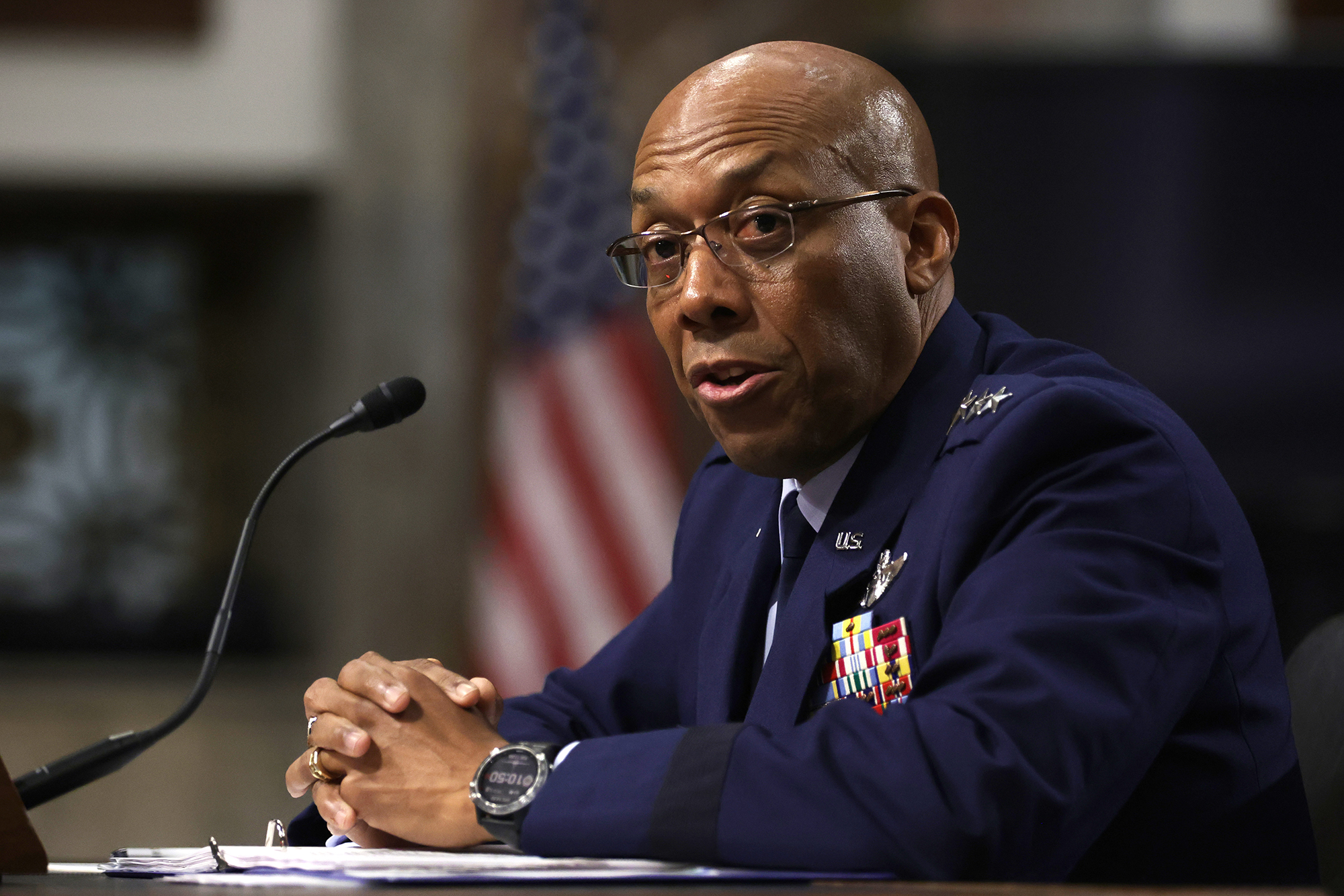
Photo: Chairman of the Joint Chiefs of Staff Charles Brown promised that allies will not tire of supporting Ukraine (Getty Images)
Pentagon Chief Lloyd Austin was also asked about the risks of a Russian breakthrough on the front lines.
"What we have seen on the battlefield is a series of incremental gains by the Russians... These gains have come at a significant cost in terms of personnel and equipment... As I have been engaged, my counterparts and the Chief of Defense in Ukraine, they feel confident in their ability to continue to defend their sovereign territory and hold the line. Of course, they need munitions, they need support in order to be able to continue to do that. And, of course, that's where the supplemental comes in. We certainly would hope that we would see the supplemental get passed soon," he noted.
According to him, it all depends on the US Congress, so it is difficult to make any forecasts regarding the timing. Nevertheless, since Washington's support is necessary, he is optimistic that concrete steps will be taken soon.
Moreover, Austin responded to the question of whether it is worth reformatting Ramstein and holding meetings of Ukraine's partners on NATO's platform. In his opinion, the current format has proven its effectiveness, with a "large number of participants coming to each of the 20 meetings to express support for Ukraine."
"The UDG has been a very effective forum, as you know...Now, over time, we will shift from a focus on the correct fight solely to more on a focus on building a longer-term capability for Ukraine. And you're already starting to see what we're doing, with our capability coalition, we have countries that have volunteered to lead these coalitions that are focused on the critical warfighting capabilities that Ukraine will need to be able to defend its sovereign territory and deter aggression in the future. And so, we'll see that transition continue as we go forward," he emphasized.
What aid did the allies announce?
Germany
German Defense Minister Boris Pistorius announced a new aid package of 500 million euros.
"This is a German package. Germany will also support Ukraine's defense against Russian aggressive war in the short term with further supplies of ammunition," he said.
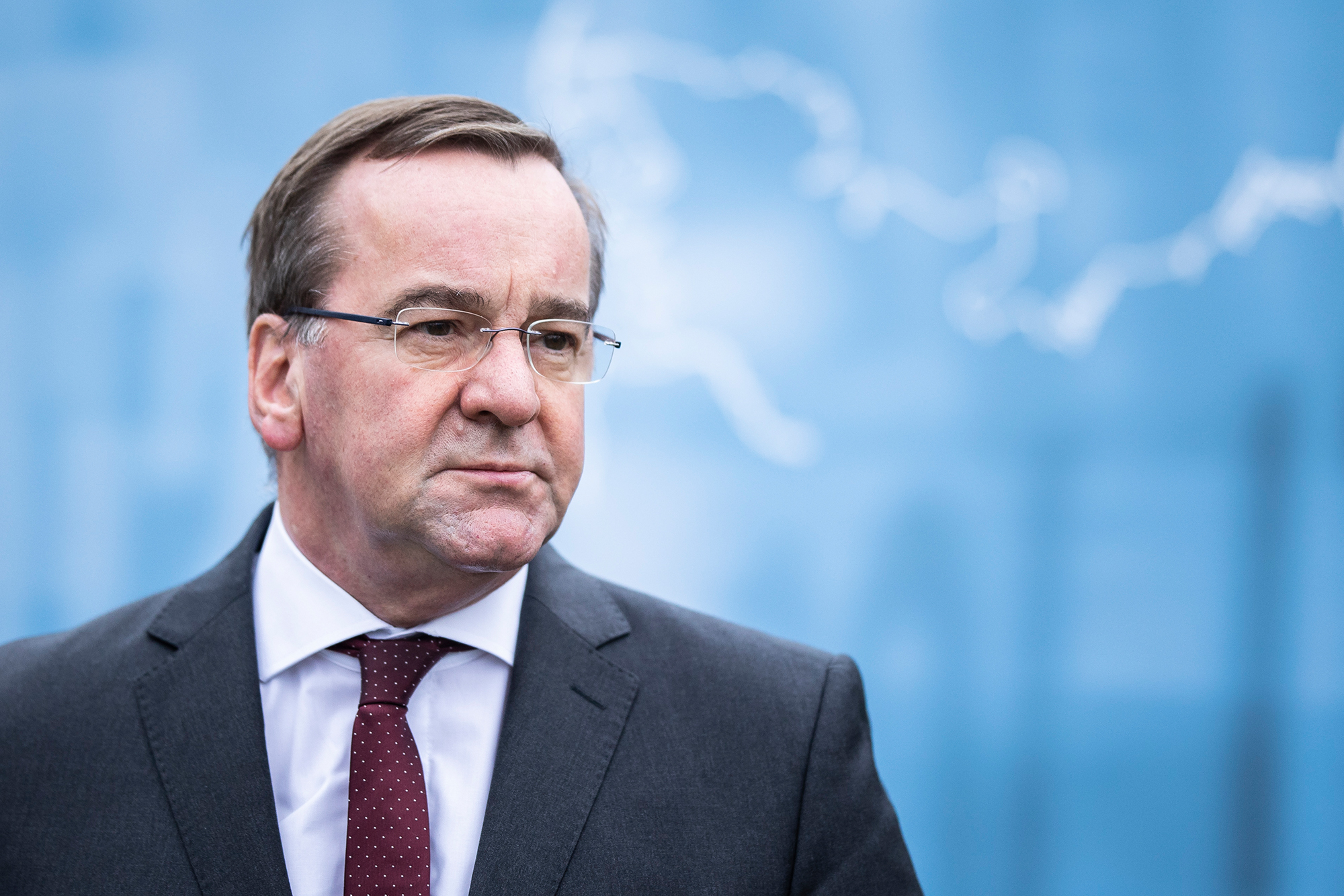
Photo: German Defense Minister Boris Pistorius announced a new package for Ukraine worth 500 million euros (Getty Images)
It is planned that as part of this package, Germany will provide 10,000 artillery shells from Bundeswehr stocks. In addition, it will include 100 infantry fighting vehicles and 100 transport vehicles.
According to dpa, with this package, Berlin's total aid in 2024 reaches 7 billion euros. This amount also includes funds allocated for the Czech initiative to purchase ammunition. Thus, the German side will finance the purchase of 180,000 shells. It is also known that the government will order another 100,000 shells from German industry. The latter two points are medium- and long-term aid.
It should be noted that before Pistorius' meeting, he was asked whether Ukraine could expect news about Taurus aviation missiles with a range of about 500 km, but he replied, "there is no news." Adequate quantities of artillery ammunition, longer-range rocket artillery, and air defense are "really existential issues," he added.
As Chancellor Olaf Scholz stated, military aid will be the most important message to Putin. According to him, he must know that the hope for fatigue from Ukraine is mistaken, and "he should not count on the election of a US president who will bury Ukraine."
Finland
Finnish Defense Minister Antti Häkkänen announced that he discussed the Czech initiative to purchase hundreds of thousands of ammunition for Ukraine at a meeting with Czech Chief of Staff Karel Rehka.
"Finland is participating in this initiative, allocating 30 million euros," he said.
The day before, Romanian President Klaus Iohannis approved the transit of combat boats transferred to Ukraine by Finland. The number and specific type of vessels are not disclosed. It is also reported that about 50 Ukrainian military personnel will undergo training on Romanian territory.
Belgium
Last week, the Belgian government gave the green light for a large aid package for Ukraine. Defense Minister Ludivine Dedonder announced that the package, totaling an additional 412 million euros, will consist of three parts.
_1.jpg) Photo: Belgian Defense Minister Ludivine Dedonder previously announced the provision of a large aid package of over 400 million euros (belgian-presidency.consilium.europa.eu)
Photo: Belgian Defense Minister Ludivine Dedonder previously announced the provision of a large aid package of over 400 million euros (belgian-presidency.consilium.europa.eu)
It is reported that in cooperation with the Netherlands, three Alkmaar-class mine countermeasure vessels will be transferred. Belgium will take on the basic training of personnel at the naval academy, and technical maintenance of mine sweepers to ensure their seaworthiness and operability, while the Netherlands will train crews on-site.
The second part involves the purchase of armored rapid response vehicles as part of a joint initiative of the Benelux countries. It is reported that they intend to modernize them before transfer. In addition, joint procurement of reconnaissance drones and the transfer of about 300 Lynx Light Multirole Vehicles (LMVs) is planned.
As reported by the media, these are multi-purpose armored vehicles of Italian production, Iveco LMV. The main functions include reconnaissance, patrolling, communication support, escort, and service. Various machine gun armaments can be installed on the vehicle.
The largest part of the package - 373.1 million euros - will go towards the supply of artillery ammunition from Belgian stocks, as well as through international group purchases.
Denmark
Last week, Denmark announced a package of $330 million. It will include self-propelled artillery installations Caesar, self-propelled 120mm mortars, and ammunition for them. It was also reported that Caesar howitzers will be provided in cooperation with France, and 155mm shells - with Estonia and the Czech Republic.
"Artillery and mortar systems are in great demand from Ukraine. With this aid package, we make a significant contribution to the fight for Ukraine's freedom... The aid is provided in cooperation with our allies and sends an important signal that we support Ukraine on a broad front," said Danish Defense Minister Troels Lund Poulsen.
USA
Also last week, the White House allocated a package of $300 million - the first since December last year. It includes:
- anti-aircraft interceptor missiles
- GMLRS rockets for HIMARS reactive systems
- 155mm artillery shells (including fragmentation, high-explosive, and cassette)
- 105mm artillery shells
- 84 anti-tank complexes
As stated by the US President's national security advisor Jake Sullivan, this package will be enough for several weeks. The aid became possible due to cost savings in contracts. It is known that the Pentagon has about $4 billion left for weapons for Ukraine from its stocks, but Washington is not rushing to use this funding because there is no money left to replenish reserves.
Pentagon spokeswoman Sabrina Singh warned that the March package was unique and there would be no opportunity to repeat it. Further support for Ukraine depends on when the US Congress will vote on multi-billion-dollar aid. It is expected that $60 billion could be unlocked in March or April. However, Republicans in Congress are seriously considering providing some of the funds requested by the Biden administration in the form of interest-free loans rather than grants, as was the case before. Accordingly, a new bill must be prepared for this.
